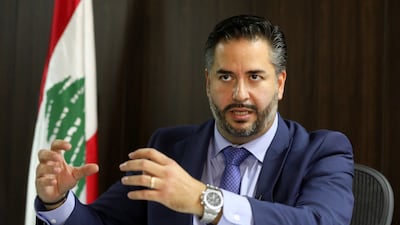Lebanon’s Information Minister George Kordahi "has to resign" to solve a worsening diplomatic row between Lebanon and Gulf countries sparked by his inflammatory comments last week, the country's economy minister told The National.
Economy Minister Amin Salam said the information minister’s resignation would show “some positivity and defuse the escalation”.
“Otherwise, we are going to a bad place and showing that we are willing to jeopardise the entire country for one minister. It does not reflect well,” he said.
Saudi Arabia banned all imports from Lebanon and gave its ambassador 24 hours to leave the kingdom on Friday after Mr Kordahi criticised its presence in Yemen and voiced support for the Iran-backed Houthi militant group in a television interview.
In solidarity with Saudi Arabia, the UAE and Bahrain pulled their diplomats from Lebanon and called on their citizens to leave the country. Kuwait also withdrew its representatives.
Mr Kordahi, a media personality, told Lebanese television on Sunday that his resignation was “out of the question”, but he appeared to soften his position on Monday.
Asked about the timing of his resignation by local newspaper Addiyar, Mr Kordahi was quoted as saying “let us wait for the Prime Minister” Najib Mikati to return from Glasgow, where he is attending the Cop26 climate change conference.

Mr Mikati discussed the crisis between his country and the Gulf with world leaders including French President Emmanuel Macron and senior figures such as US Secretary of State Antony Blinken.
Saudi Arabia’s ban on Lebanese imports struck a blow to the Lebanese economy, which is already suffering from a severe crisis following the collapse of the financial sector two years ago.
The kingdom had issued a ban on Lebanese fruit and vegetables in April after customs officers discovered millions of amphetamine pills hidden in a shipment of pomegranates.
So far, Lebanon has not received reassurances that Saudi Arabia will lift the ban should Mr Kordahi resign, Mr Salam said.

Lebanese officials fear that if Mr Kordahi does not step down, Saudi Arabia might further retaliate by banning Lebanese expatriates from sending remittances home.
This would cause an “economic disaster”, Mr Salam said, pointing out that such transfers have been the main sources of cash for the Lebanese since banks imposed de facto capital controls in 2019.
Lebanese living in the Gulf send billions of dollars every year to relatives in Lebanon, Mr Salam said.
In 2020, remittances constituted close to 33 per cent of Lebanon’s GDP, which is the highest ratio in the Arab World, according to a recent report published by Lebanon's Byblos Bank.
The latest Lebanese Cabinet has faced a series of hurdles since it was sworn in on September 10 after 13 months of negotiations.
The devastating explosion in Beirut’s port in August 2020 forced the previous government to resign.
The investigation into the blast is opposed by Lebanon’s political class and caused street clashes that killed seven people.
Iran-backed Hezbollah and allied ministers started boycotting Cabinet sessions on October 12.
“I really hope that as soon as PM Mikati comes, he will meet the President [Michel Aoun] and they will find a diplomatic, elegant exit for Kordahi with a very positive message to the Gulf Co-operation Council countries,” Mr Salam said.
Mr Mikati is expected back in Beirut in the next few days.
Mr Kordahi is backed by a small Christian political party – the Marada – an ally of Hezbollah, one of the most influential parties in the country because of its regional militia.
Hezbollah has threatened to withdraw from the Cabinet along with its allies, should Mr Kordahi be pushed out, Mr Salam said, echoing media reports.
“Those discussions were brought to the table by ministers that are aligned with Kordahi, either from Marada or Hezbollah, or parties that back both. The understanding is that this has been a position that they took to support him,” Mr Salam said.
But such a move, which would collapse the government, would hurt efforts to dig Lebanon out of its economic crisis.
“If the government collapses, the negotiations with the IMF will be over, the negotiations over the maritime borders [with Israel] will be over. It will jeopardise everything that Lebanon needs as oxygen. It will be catastrophic,” Mr Salam said.
Mr Salam said he hoped that Lebanon and the IMF would sign a memorandum of understanding by the end of the year to pave the way to full negotiations for a bail-out.
A corporate lawyer and an economic consultant, Mr Salam was appointed minister with the backing of Mr Mikati. He was part of an emergency committee tasked with tackling the diplomatic crisis with Saudi Arabia that also included the minister of foreign affairs and the education minister, he said.
Mr Salam said that he hoped that the Cabinet would meet again next week.







